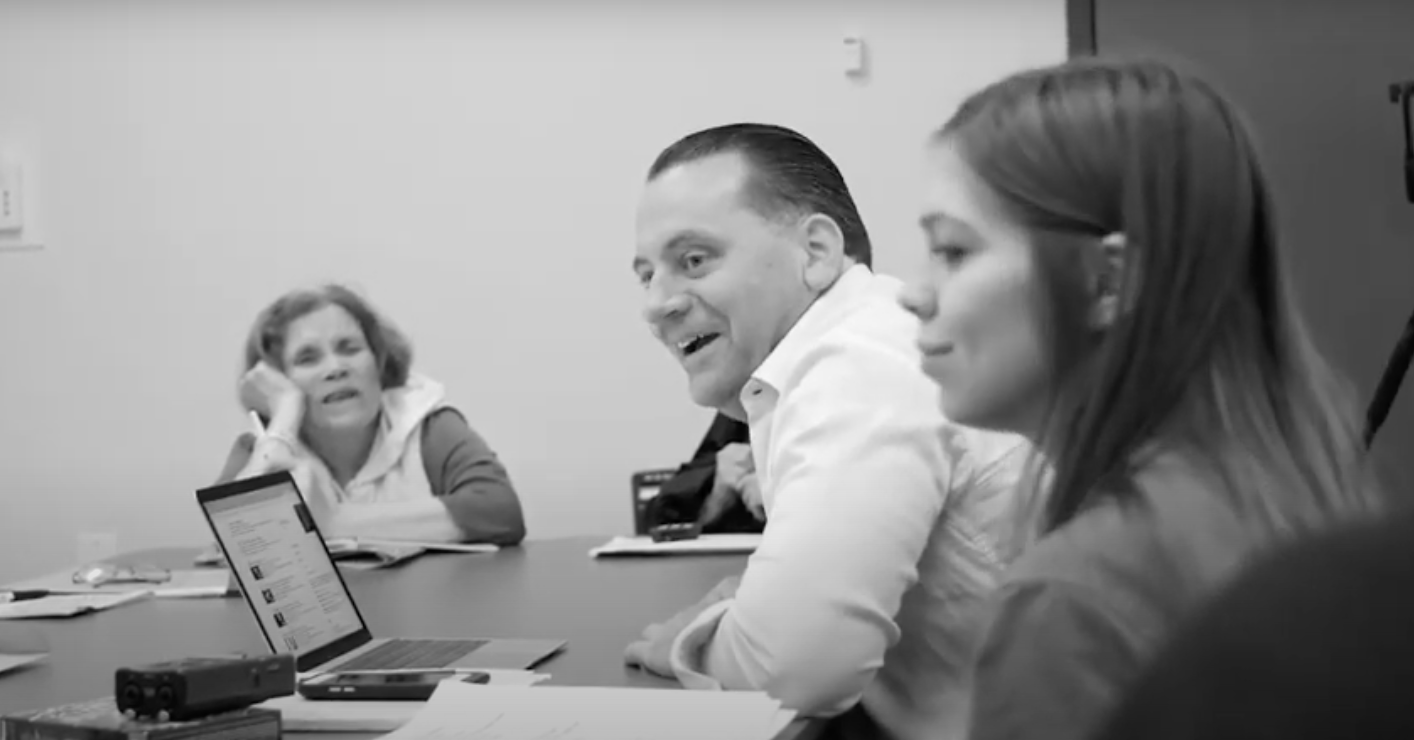Dave Johnson is a teaching artist bringing poetry to formerly incarcerated individuals in New York City through Free Verse. Inspired by his work with Teachers & Writers and as the Poet in Residence for the NYC Department of Probation, Johnson saw a need for an outlet that could cultivate poetry and address practical concerns like economic inequality. He founded Free Verse, a working artists program, in a probation office waiting room in the Bronx to give participants the chance to express themselves through poetry, prose, and song. A few graduates of his program now work as paid teaching assistants and help support the T&W workshop program at VISIONS: Services for the Blind and Visually Impaired. From February 23 to April 19, the Queens Museum will be exhibiting a retrospective of the last ten years of Dave’s work with Free Verse accompanied by a display of the courageous work of participants whose lives have been changed by the program.
In Spring of 2020, Victoria Collins spoke with Dave about Free Verse.
Victoria: How did you begin working with formerly incarcerated individuals?
Dave: One of the things I discovered in partnering with Lonni Tanner and the New York City Department of Design and Construction through research was how long people were waiting in New York City probation offices and we began to focus on the waiting spaces within the NYC Department of Probation.
They redesigned these spaces in probation facilities all over the city—each borough has one. In Brooklyn, there are three. They renamed them NeONs (Network Opportunity Networks) and tried to recreate the space and make it something more than a correctional facility.
We redesigned the furniture, started putting art on the walls and even had graffiti artists come in and do the bathrooms. It’s funny: after we did that, we didn’t have the problem of people writing on the bathroom walls. But nothing had really changed and there was no new money going into the system, so there was nothing really getting at the root of the problem.
Victoria: How did you go from redesigning these spaces to leading poetry workshops in the waiting rooms?
Dave: I started by coming in a couple days a week and just watching. It took me a couple of months but it eventually came to me and I said,”I think we can turn this space into a cafe.” I think we can change what this space represents so that when people are waiting, it’s not for nothing. Things are actually being achieved and accomplished. And yeah, you had to sit here all day because it was mandated by the court, but while you were here, you could write a book, we could record a CD.
It was organic. I never set out to start the Free Verse writing program. I figured, after three months, they’d say “hey, that was fun,” and I’d be out looking for work, but probation had serious needs and the longer I stayed, the more I realized that this was more than a poetry program.

Victoria: Was it difficult to get people interested in poetry?
Dave: In the beginning no one wanted to write. I’d go around and ask, “You wanna write a poem?” I set up a laptop in the middle of the room with a couple tables. At first I was facing out. There’s a door behind me where the probation officer comes out and calls people in & so everybody’s looking everytime that door opens because they wanna be called. They’ve been there for hours. Imagine being there 8 o’clock in the morning and your probation officer leaves at one for lunch and you haven’t seen him yet. And they have to walk through that space.
“I gotta go to work”
“I’m gonna get fired”
“I gotta feed my kids”
“I’m gonna be in worse shape than I was when I came here.”
It’s real. And I used to say when I was a kid, “I wanna be a part of the revolution,” and it dawned on me that if a revolution is ever gonna happen, it’ll be right here in this room. Something is happening here. These folks need something. It’s poetry, but it’s something even more. There’s stories that need to be told about why they are here.
Free Verse was about recognizing that the only difference between any one of us is opportunity. That’s it.
That’s the basis of where we start. We believe in poetry. We believe in art. We believe in song. But it’s about opportunity. One thing I never do: I never ask people what they did to land there. Of course, they’ll tell stories. And it’s not that I don’t care, I don’t want that to be the basis of our conversation. Let’s approach this thing on level ground and see where it goes.
Victoria: How did Free Verse evolve into a working artist program?
Dave: Using the model of Teachers & Writers Collaborative—how they taught and how their educators went out—I thought “if I can teach these guys to write in this space and spark some kind of an initiative maybe I can get them to do what I do.” I’m not going to be here forever. I need someone to carry this on. There’s got to be people in this room that get it, that understand.
That’s why I started thinking about it as a working artist program. So I went back to the Dept of Probation and they saw we were making progress. For the first three months, I was the only one reading. I started an open mic. I had a captive audience. After a while, people were like “is he gonna read the whole time?” I said, “If no one’s gonna read, I’m gonna keep reading.” Eventually, they got sick of it. Now, I can’t get on the mic.
Victoria: How has Free Verse grown since its inception?
Dave: We publish Free Verse magazine now. Free Verse is a publishing house, working artist program, and a magazine of poetry, prose, art, and song. Turning waiting time into creative time. We’re headquartered in the waiting room of this probation center in the south Bronx, born and bred. We started this magazine, got this thing rolling, and published 6 issues in the last 10 years and one full length book. We had one young man get the opportunity to go study abroad in Italy for three weeks. It was not an easy task. He had to get a release from the judge. He said it changed his life. Guys are performing all over the place. I was even able to secure a small stipend to work every week, 10 hrs/week for a year and at the end of that, I started trying to help them get placed as a teaching artist in other spots, working with myself or other artists as assistants. And Teachers & Writers, both Amy Swauger and Asari Beale, have been incredibly supportive.
Victoria: What’s been the thing that’s given you the most satisfaction?
Dave: Well you always feel like there’s more. You just hope at the end of the day that something has happened—even in a small way. I always have to remember why I did it in the first place. Because that’s what I really wanted to do. I wanted to go talk about poems and connect with people. And that’s it.
I remember I once taught kindergarteners simile and metaphor. I remember the principal walking in in the middle of an exercise.
I said, “His shirt is blue like a ?”
Class: “Blueberry!”
Dave: “What is that?”
Class: “That’s a simile.”
He was absolutely astounded. Yea, it’s kindergarten, but they get it. All you gotta do is give them the tools. They know what a simile is.
He asked, ”How did you do that?”
And I said, “No they did that.”
Victoria: As an educator who has experience working with all age groups, is there one thing that remains consistent from teaching little kids to teaching seniors?
Dave: It’s always about the words, about the poem. It doesn’t matter what age—poetry is in people. Every culture on this planet has songs and poetry. It comes from a deep place, from before birth. We know rhythm before we know language. It’s not necessarily a form that we call language but it’s there. We want to hear your song.



